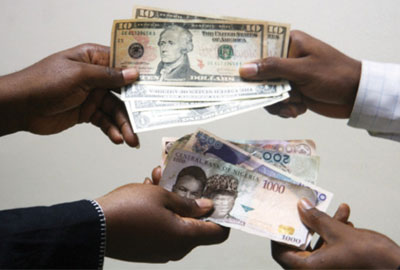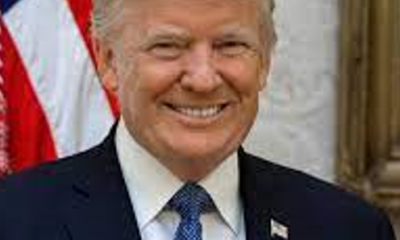International News
BRICS vs. Dollar: Trump Issues Trade Threats To Emerging Bloc
President-elect Donald Trump has issued a sharp warning to BRICS nations, threatening to impose a 100% tariff on their exports to the United States if they pursue efforts to reduce reliance on the US dollar in international trade.
In a statement posted on his Truth Social platform, Trump demanded assurances from the BRICS bloc—which includes Brazil, Russia, India, China, and South Africa, along with new members such as Iran, Egypt, and the UAE—that they would abandon any plans to create an alternative global currency.
READ ALSO: Tinubu, Ramphosa Co-Chair Bi-National Commission’s 11th Session
“We require a commitment… that they will neither create a new BRICS Currency, nor back any other currency to replace the mighty US Dollar, or they will face 100 percent tariffs,” Trump wrote.
The warning follows the BRICS summit in Kazan, Russia, where member states discussed measures to strengthen local currencies and reduce reliance on the dollar in trade.
A joint declaration issued at the summit endorsed initiatives such as expanding correspondent banking networks and enabling settlements in local currencies under the BRICS Cross-Border Payments Initiative.
Despite these discussions, Russian President Vladimir Putin acknowledged that progress on more ambitious goals—such as a unified BRICS currency or a competitor to the SWIFT financial messaging system—remains limited.
“As for SWIFT and any alternatives, we have not created and are not creating any alternatives,” Putin said at the conclusion of the summit. He added, “As for a unified BRICS currency, we are not considering that question at the moment.”
Trump, however, dismissed such reassurances, signaling his intent to protect the dollar’s dominance in global trade.
“If BRICS countries continue with their plans, they should expect to say goodbye to selling into the wonderful US Economy,” he warned.
“They can go find another ‘sucker!’ There is no chance that the BRICS will replace the US Dollar in international trade, and any country that tries should wave goodbye to America.”
This marks a continuation of Trump’s protectionist trade agenda, which defined much of his first term in office.
His administration imposed steep tariffs on countries such as China and Mexico, citing the need to safeguard American industries.
International News
Massive 7.7 Magnitude Earthquake Rocks Myanmar, Shakes Southeast Asia
A powerful 7.7-magnitude earthquake struck central Myanmar on Friday, shaking the region and sending tremors as far as Thailand and China.
The quake’s epicenter was located in the Sagaing region, near Mandalay, Myanmar’s second-largest city, home to around one million people and renowned for its historic temple complexes.
Panic erupted as buildings swayed and dust filled the air.
READ ALSO: Powerful 6.8-Magnitude Earthquake Hits China, Dozens Killed
In Mandalay, videos shared online showed terrified residents rushing out of residential towers while traffic came to a sudden halt.
Reports indicate that a major bridge spanning the Irrawaddy River collapsed into the water in a cloud of dust and debris.
The quake was felt as far as Bangkok, Thailand’s capital, where video footage showed a partially constructed building in Chatuchak Park crumbling to the ground.
Thai authorities reported that 43 people were trapped in the wreckage, while seven others sustained injuries.
In Chiang Mai, a resident described feeling the tremors for about ten seconds before fleeing into the streets.
In Myanmar’s commercial hub, Yangon—about 380 miles from the epicenter—residents also experienced the powerful shaking.
One resident recalled, “We felt the quake for about a minute, then ran out of the building.
It was very sudden and very strong.” Another noted that phone networks in the city, home to around 8 million people, briefly went down but were later restored.
Myanmar, one of Asia’s poorest nations, is already grappling with the effects of a brutal civil war sparked by a military coup over four years ago.
The conflict has devastated the economy, and the country remains ill-equipped to handle a major natural disaster of this scale.
The Sagaing region, where the earthquake struck, is a war zone with multiple factions—including the ruling junta, pro-military militias, and rebel groups—fighting for control.
The ongoing violence has made travel by road or river extremely dangerous, posing significant challenges to delivering emergency aid and assessing the full extent of the damage.
Tremors were also felt in China’s southwestern Yunnan province, underscoring the quake’s intensity.
Authorities across the region are now assessing the situation, with emergency teams mobilizing in both Myanmar and Thailand.
International News
Samsung Electronics Co-CEO, Han Jong-hee Dies At 63

Han Jong-hee, co-CEO of Samsung Electronics and a driving force behind the company’s dominance in the global television market, has died of a heart attack at the age of 63, the company confirmed on Tuesday.
“He died from cardiac arrest today,” a Samsung spokesperson stated, adding that Han is survived by his wife and three children.
Having joined the company in 1988, Han played a significant role in shaping Samsung’s television business.
READ MORE: Samsung Reports Worst Quarterly Profits In 14 Years
His leadership was instrumental in the launch and success of the company’s high-end LED TVs, which helped establish Samsung as a global leader in the industry.
“Han was central in the unveiling of Samsung’s world-class LED TVs,” the company noted in a biography published earlier this month. “His numerous other innovations enabled the company to continually demonstrate its technology leadership.”
His efforts ensured that Samsung maintained its position as a dominant force in the global television market.
Han’s death comes at a time when Samsung Electronics is grappling with challenges in the AI chip sector.
The company has been facing difficulties in meeting Nvidia’s standards, while its South Korean competitor, SK Hynix, has emerged as the leading supplier of high-bandwidth memory (HBM) chips for Nvidia’s AI processors.
Chairman Lee Jae-yong recently underscored the urgency of the situation, urging Samsung to adopt a “do-or-die” approach to overcome the growing challenges in the AI industry.
Last October, the company acknowledged it was facing a “crisis,” citing concerns over its “fundamental technological competitiveness and the future of the company.”
International News
Pope Francis To Return To Vatican After Month-Long Treatment
Pope Francis will on Sunday be discharged from Rome’s Gemelli hospital, where he has been receiving treatment since February 14 for breathing difficulties and pneumonia.
The 88-year-old pontiff will return to his residence at Saint Martha’s House in the Vatican, where doctors have advised that he undergo “a long convalescence… of at least two months.”
Speaking to reporters on Saturday, Dr. Sergio Alfieri explained that while the pope’s health is improving, further recovery is best achieved at home.
READ ALSO: Pope Francis’ Condition Improving, Says Vatican
“Further progress will take place at his home, because a hospital — even if this seems strange — is the worst place to recover because it’s where one can contract more infections,” Alfieri said.
Dr. Luca Carbone, another physician at Gemelli, added that there are positive signs in the pope’s condition. “We hope that he will soon be able to resume his normal activities,” he stated.
Before leaving the hospital, Pope Francis is expected to greet the public and offer a blessing from a hospital balcony after the Angelus prayers on Sunday, marking his first appearance in weeks.
Speculation about a possible resignation has been circulating due to the pope’s prolonged absence from public duties, but Vatican officials have firmly denied such claims.
When asked if the topic had been discussed, Vatican Secretary of State Pietro Parolin was clear in his response: “No, no, no, absolutely not.”
The pope, who had part of a lung removed in his youth, has received an outpouring of prayers and well-wishes from Catholics worldwide.
Supporters have been gathering outside Gemelli hospital, leaving flowers, candles, and messages of encouragement.
His hospitalization, the longest of his papacy has led to questions about how Easter celebrations will be handled in his absence.
However, Vatican officials remain optimistic about his gradual return to his duties in the coming weeks.



















